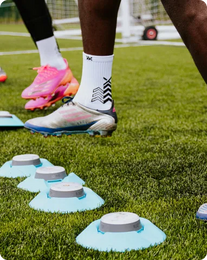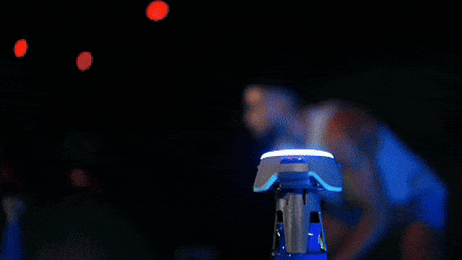Imagine the season has just ended. You've given it your all, experienced the highs and lows, and now you deserve a break. Whether you reached your goals or not, taking time off is crucial. However, completely stopping all physical activity during the off-season can be just as detrimental as overtraining.
Off-season training is essential for maintaining your fitness levels and preventing a significant drop that would make it harder to regain form when the new season begins. It also allows you to address any weaknesses or imbalances in your body, ensuring you come back stronger and more balanced.

Off-season training doesn’t mean pushing yourself to the limit. It’s about finding a balance - engaging in lighter, varied workouts that keep you active without draining your energy. Activities like yoga, swimming, or light resistance training help maintain your form while allowing your body to recover from the season's intense demands.
Maintaining your fitness during the off-season ensures you don't lose the progress you've made. It’s also crucial to avoid incorrect techniques that can lead to injuries. Proper off-season training keeps you fit, focused, and ready for the next season, preventing the need for a strenuous catch-up phase.
Learn how off-season training can promote long-term performance and keep you on track to smash your goals.
Injury Prevention
Injuries are every athlete's nightmare, but the off-season offers a prime opportunity to prevent them. By focusing on off-season training, athletes can significantly reduce the risk of injuries during the competitive season.
Off-season training isn't just about staying fit; it’s about enhancing reaction time and building Reactive Intelligence. These elements help athletes recognize, prepare for, and avoid potential dangers before they occur.
Although reflexes can’t be directly trained, athletes can train their reactions into reflexive behaviors. For example, touching something hot triggers us to instinctively recoil before our brains even register the pain. Similarly, off-season training can teach athletes to react instinctively to gameplay dangers, minimizing injury risks.

BlazePod’s system exemplifies this approach. It integrates cognitive and physical challenges into training routines, working athletes’ mental and physical responses simultaneously. This dual training helps prepare athletes for any situation, enhancing their ability to plan and execute safe and effective movements during play.
By focusing on off-season training that combines physical and mental preparation, athletes can significantly enhance their performance and safety, reducing the likelihood of injuries and ensuring they’re ready to hit the ground running when the season starts.
Maintaining Fitness and Stamina Capabilities
Just as crucial as resting in the off-season is sustaining fitness and staying in shape without overworking your body. Rather than abandoning any regiment entirely, focus on building a solid, resilient physique through strength training to endure the demands of your sport.
Add mobility and flexibility exercises to improve your range of motion. This way, instead of overworking or underworking your body, a balanced approach ensures that you are not only maintaining fitness but also consistently enhancing your athletic capabilities.
This is all possible, and more, with BlazePod. The light training platform offers an innovative way to keep training engaging and effective during the off-season. The app features the Benchmark tool to compare where you stack up in the global stages and a Leaderboard to track your time and compare it to your teammates and friends; making workouts competitive and engaging.

As a coach, BlazePod motivates athletes to stay consistent, helping them track progress and stay connected with their goals, even in the off-season.
Staying active without overdoing it is the secret to a thriving off-season. Aim to keep your fitness and stamina at a solid base, keeping you primed and ready for the on-season. This strategy will ensure a smoother transition back into intense competition. Start the season with ferocity and without wasting time regaining your strength.
By pouring your energy into a balanced and engaging approach to off-season training, you can keep fit, avoid burnout, and enhance your performance when it matters most.
Set Goals for Next Season
Without a goal to strive for, an athlete is missing that key component to achieve greatness. Setting goals during the off-season is essential for becoming a better athlete during the regular season.
Establishing both outcome goals, results you aim to achieve, and process goals, the steps to get there, provides clear direction for your training. To push your limits, consider creating a stretch goal. This ambitious target challenges you to step out of your comfort zone. These goals don’t need to be tied to specific events; they can focus on improving weaknesses or achieving new personal records in power and performance.

By setting and working towards these goals, you create a structured plan that keeps you motivated and focused. This preparation makes the transition into the on-season smoother and more effective, allowing you to start the season strong, with improved skills and confidence. Off-season goal setting is just as crucial as rigorous training, ensuring continuous progress and peak performance when it matters most.
Additionally, use the off-season to address any weaknesses that might be preventing you from reaching your goals.
Accepting Detraining and Inconsistency
Let’s face it; we will never be the most optimized version of ourselves 100% of the time. During the off-season, it's natural to experience some decline in fitness. Accepting this is key to maintaining a healthy mindset and preparing for the next season.
Your ‘base abilities,’ the bare minimum of skills, are more resilient and last longer than the high-power abilities you require for peak performance. The off-season period is not about maintaining top-level performance but about rest and recovery.
Rather than trying to maintain peak performance consistently, embrace this time to focus on low-intensity activities that keep you active without stressing your body. Try cross-training exercises like swimming, cycling, or yoga to maintain a basic level of fitness and flexibility. The variety can also help prevent overuse injuries and keep your workouts enjoyable.

The off-season is an opportunity to recharge physically and mentally. It's a chance to step back from the intense demands of your sport, giving your body and mind the rest they need to come back stronger.
By accepting that, your fitness levels will differ, you will set yourself up for a more successful and sustainable athletic career.
Conclusion
Effective off-season training is essential for preventing injuries, maintaining your fitness capabilities, and understanding the reality of detraining. Concentrating on these areas can ensure a smooth transition back into intense training, stay fit, and enhance your performance for the next season. Keep pushing towards your goals, while taking a step back and enjoying the break.

























